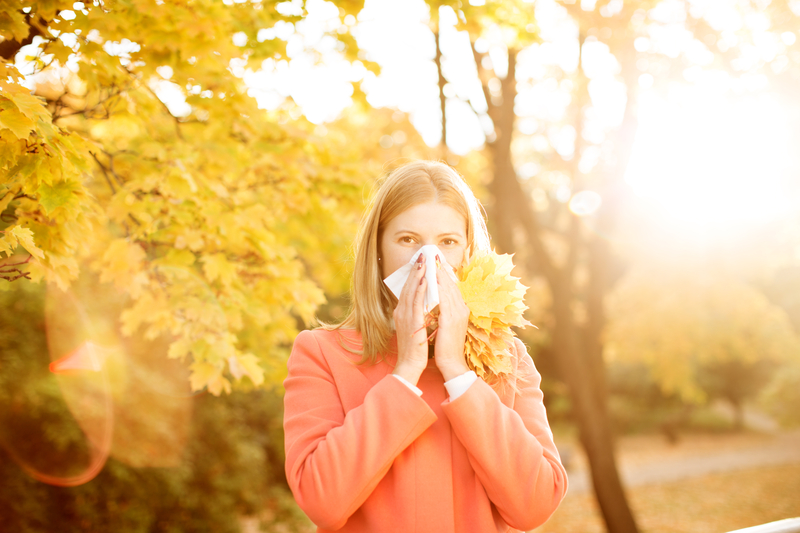
Why Am I Getting Hayfever in Autumn?
In this blog I wanted to let you know that you are not alone if you suddenly find that you are getting hayfever-like symptoms in autumn. Whereas most seasonal allergies are usually associated with the higher pollen counts in spring and summer (in the Northern Hemisphere – and our Southern Hemisphere brothers and sisters will of course get these in winter!) there are ever greater numbers of people developing all the usual hayfever symptoms – out of season!
Unveiling Autumnal Allergies: My top Natural and Holistic tips for Seasonal Sniffles
As the vibrant hues of autumn leaves begin to flourish, a less colourful aspect of the season often emerges: seasonal allergies. The crisp air that heralds the approach of fall is also laden with allergens that can trigger uncomfortable symptoms in many individuals. Understanding why we get these allergies and exploring natural, holistic, dietary, and supplemental strategies can provide relief and improve our quality of life during this otherwise beautiful season.
The Roots of Autumnal Allergies
The main culprits of fall allergies are ragweed pollen, mold spores, and dust mites. Ragweed plants are prolific pollen producers, and a single plant can release up to one billion grains of pollen during the season. Mold spores get a fresh lease on life amidst the damp fallen leaves and the harvest remnants in agricultural settings. Dust mites, on the other hand, tend to surge as we turn on heating systems, stirring up dust collections that have settled over the summer months.
When these allergens are inhaled by individuals with sensitive immune systems, the body misidentifies them as harmful invaders. This triggers the release of histamines, which leads to the well-known allergy symptoms such as sneezing, itchy eyes, runny nose, and coughing.
Natural and Holistic Strategies
Embrace a Balanced Diet
A diet rich in fresh fruits and vegetables can boost the body’s immune system and combat allergies. Foods high in Vitamin C and beta-carotene, such as oranges, carrots, and leafy greens, can naturally help reduce inflammation and allergic reactions.
Consider Quercetin and Bromelain Supplements
Quercetin, a natural bioflavonoid, is known to stabilize mast cells and reduce histamine release. Bromelain, an enzyme found in pineapple, enhances the absorption of quercetin and can also reduce nasal swelling and thin mucus, making it easier to breathe.
Stay Hydrated
Drinking plenty of water is crucial during allergy season as it helps to thin the mucus in the nasal passages and promotes better drainage.
Enhance Your Environment
Using a dehumidifier can keep your indoor air at a humidity level that is less hospitable to mold and dust mites. High-efficiency particulate air (HEPA) filters can also capture many of the airborne allergens that are responsible for triggering symptoms.
Practice Nasal Irrigation
Nasal irrigation with a saline solution can be a simple and effective way to clear allergens from the nasal membranes, reduce the volume of mucus, and decrease postnasal drip. Try a neti pot – these have been used successfully for millennia in Ayurvedic medicine.
Use Essential Oils
Eucalyptus oil, for example, is widely regarded for its ability to clear nasal passages and reduce congestion. Peppermint and tea tree oils also have natural anti-inflammatory and antibacterial properties that can mitigate allergy symptoms.
Lifestyle Modifications
Plan Outdoor Activities Wisely
Pollen counts tend to be higher in the morning and on warm, windy days, so scheduling outdoor activities when counts are lower can reduce exposure.
Create an Allergen Barrier
When venturing outdoors, wearing glasses or sunglasses can help protect your eyes from pollen. A hat can also prevent pollen from sticking to your hair.
Keep It Clean
Regular cleaning can reduce the amount of allergen accumulation in your home. Pay special attention to areas where pollen and mold can enter or accumulate, such as entryways, windows, and bathrooms.
Dress Appropriately
After spending time outside, changing your clothes and taking a shower can help remove pollen that may have collected on your skin and hair.
Final words of advice
While autumnal allergies can be a frustrating intrusion on what should be a delightful season, understanding and implementing natural, holistic, and dietary approaches can greatly alleviate symptoms. Integrating these strategies into daily routines can minimize the impact of allergens and help us to enjoy the fall season to the fullest. Remember that while natural remedies can be effective, it is important to consult with your qualified healthcare provider before starting any new treatment, especially if you have severe allergies or other health conditions. The Complementary Medical Association website has free-to-access lists of qualified complementary and integrative medicine professionals and natural therapists who will be able to support you and assist in relieving these pesky symptoms! Let me know which of my suggestions you are going to try in the comments below – and do share this blog with anyone you know is suffering.
Xxxxx




I have been waking in the night with a blocked nose and finding it hard to get back to sleep so I will try using Sterimar before bed as it is a saline solution. I will also take your advice on Eucalyptus oil and will put a little on a tissue next to my bed. Thanks Jayney for once again coming up with practical solutions.